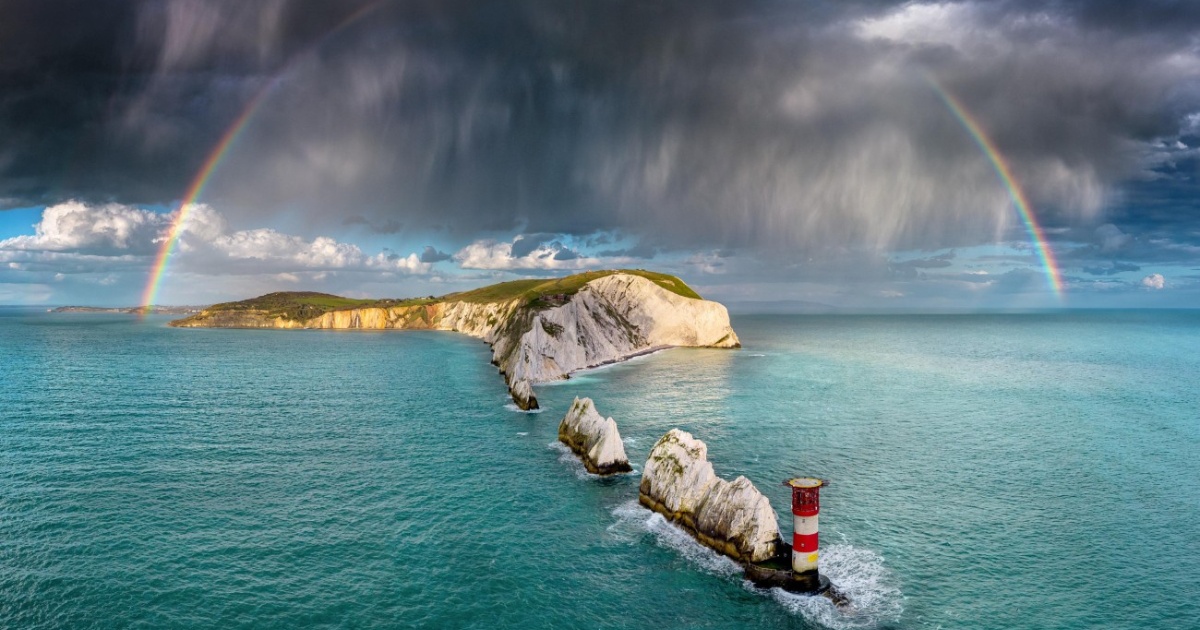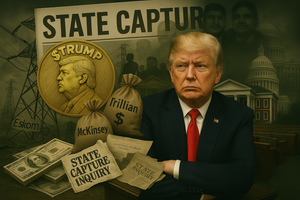US president Donald Trump has just passed his 100 days in office and as it unfolds, I can’t help wondering whether Americans should take a closer look at what happened during South Africa’s state capture period to see if there are any noteworthy parallels.
It's a crazy idea of course: South Africa and the US are diametrically different in almost every respect - economically, culturally and historically. But as a reporter who has spent much of his career covering - and discovering - the phenomenon of “state capture”, honestly I feel as though so many of the things South Africans missed in the early stages of it all are glaringly apparent, at least to me, in Trump’s first 100 days.
The idea of the US being in danger of succumbing to state capture is not new. Stellenbosch economics professor Johan Fourie in his latest blog “Feudal America”, discussed it at length, though he doesn’t think term state capture is quite the right way of describing the problem.
Oddly enough, I do - although there are some significant differences, which I’ll get to.
But let's start with an attempt to define state capture and how it differs - and overlaps! - with ordinary corruption, kleptocracy, or clientelism.
What is state capture?
The term originated in the early 2000s, primarily from studies by the World Bank in the context of post-communist transitions in Eastern Europe and the former Soviet Union, where powerful actors, often oligarchs or elite groups, systematically influenced state institutions to shape laws, policies, and regulations for their private benefit.
It points to a systemic process where private individuals or groups manipulate state institutions to secure long-term advantages, often by shaping laws or policies in their favour.
To South Africans, this will sound enormously familiar. Fourie uses the example of Denel from the many. For me, the most egregious examples were Eskom and Transnet, partly because in both cases, the amounts of money involved were staggering.
The Eskom case was particularly noteworthy because of how huge international companies like McKinsey got sucked in. It began innocently enough, but as things unfolded, they were eventually required to do this funny little dance, where they pretended to be unaware and ill-informed. And this is despite the fact that the whole raison d'etre of business advisory groups is to understand the business environment intimately because what they are selling is commercial insight.
I also think the sheer, unrelenting gall of the Gupta family - not to mention their almost unimaginable greed - are instructive characteristics. The most obvious illustration is that when Eskom hired McKinsey to try and help sort out the load-shedding disaster, the Gupta’s managed through back-room manipulation to get themselves appointed as McKinsey’s black empowerment partners. This was despite the fact that they are not “black”, as defined by the legislation, not to mention that they were not even South African.
In order to hook McKinsey into giving the contract some kind of legitimacy, it had to be huge - and would have the additional benefit of providing the BEE component, Trillian, with lots of boodle for being the 35% “partner” whose job would be to do absolutely nothing. Hence, the technical value of the contract when it was signed in 2015 was R9.4-billion, which made it McKinsey’s largest contract in Africa.
When the truth all came tumbling out in 2018, Eskom had paid R1.6 billion to McKinsey and Trillian, and later that year, McKinsey voluntarily repaid R902-million, the full fee it received from Eskom, which included R320-million in interest, because, well, international reputation. So that leaves R700-million that went to Trillian and that money was, surprise, surprise, not paid back. And where you ask, are the people who put that little scheme together? Well - and I am not making this up - in parliament of course - but we all know that.
Defining state capture vs corruption vs kleptocracy
This example illustrates how state capture is different, but overlaps, with corruption or kleptocracy.
In corruption, you are generally talking about bribery or extortion and it's usually specific, isolated and transparently illegal. It's about a single deal or series of deals, often rooted in illegal force or obvious sleight of hand.
Kleptocracy describes something broader, and much more systemic; it's a kind of ongoing theft perpetrated by a network of actors.
State capture falls somewhere between the two, but its key characteristics are that it's rooted in structural control and is grafted on to existing systems that may be entirely legal. And that’s what makes it more difficult to reverse because it becomes embedded in the legal and institutional framework. Its quasi-legal nature means it operates in a grey area.
Put it this way: if the Guptas had simply extorted the money by bribing Eskom execs, even the NPA would probably have prosecuted someone involved in the Eskom case by now. (There have been arrests involved in this and other related cases, including Eric Wood and Anoj Singh from Trillian and Eskom acting CEO Matshela Koko but nothing even close to a conviction).
And in the US now?
How does this compare with what is happening in the US now?
Well, there are similarities. And differences.

The most obvious case in point, to me at least, was the decision to issue the Donald Trump meme coin $Trump on January 17 this year. The meme coin is a cryptocurrency issued on the Solana blockchain, with 80% of its supply controlled by Trump-affiliated entities CIC Digital and Fight Fight Fight.
All that happened before Trump took office, but recently the coin surged in value after Trump promised a private dinner for the top 220 holders later this month and a tour of the White House (although that may not happen). In fact, Trump himself may not even attend the dinner. Trump’s $TRUMP coin promises investors a seat at the table but they might end up shaking hands with their steaks.
So, to me, this is obviously corrupt: it’s personal enrichment through selling access. It's also a kind of kleptocracy because of the massive fees earned by the coin, totalling $350-million by March 2025, after exploiting public office for personal wealth. The dinner announcement alone earned just under $1-million.
But it differs markedly from state capture because $TRUMP extracts from private investor funds, rather than public coffers. About 810,000 crypto wallets have lost money on the $TRUMP meme coin, with collective losses totalling approximately $2-billion - but investors did put their money on the table voluntarily. SA’s state capture was a slow ANC waltz; Trump’s crypto caper is a TikTok dance—fast, flashy, and fleecing.
Neither is he manipulating legislation or state appointments to restructure state power. It's obviously dubious, but in the SA situation, the actions of Eskom and Trillian were clearly fraudulent and therefore illegal. But $TRUMP’s structure is legal under current US crypto regulations, and there are no laws barring presidents from such ventures.
However, to my mind it is similar in other ways: the greed and the brazenness, obviously. And the spectre of the governing political party following along like sheep, mouths agog, without the slightest woolly murmur.
Another similarity is how the press and civil society in the US are just not seeing it - there are lamentations here and there, and you can feel the plate tectonics slowly moving. But generally much of the US press is in a mesmerised state, largely focused on issues outside of corruption as such.
Like it is now in the US, the media and civil society groups in SA were for years absolutely blinded because they were so invested in “their” candidate and “their” party. They could only admire their candidate's beautiful clothes despite the fact that he was riding around naked. It took upstart publications like Daily Maverick and amaBhungane to lead the charge and finally convince the rest of the press, and the population at large, that the king, sadly, wasn’t actually wearing anything.
As for the fact that no restructuring of state legislation or power was required in the $TRUMP case, that’s only true up to a point. Trump was, and I’m guessing still is, a bit befuddled by all this crypto stuff. But he has embraced it and is now pro crypto generally as part of his policy initiative (read money-making grift). The question is, if Americans had known that politicians could make $350-million in 100 days by exploiting their office through issuing a meme coin, would they have closed that door?
I think they would have. If so, you could call it manipulation of the legislative environment by deliberate and intentional failure to prevent abuse. It's the politician knowing that a shop is going to be looted, but decides against calling the police because they are the ones getting most of the loot.
And what is similar here is the process of grafting the looting process onto existing structures in a way that sits in the legal grey area. That is very state capture.
State capture and state feudalism
Just to go back to Fourie’s interpretation for a moment, he says however tempting the comparisons with state capture might be, what is happening in the US is something older. It's what he calls “state feudalism”. This is a political system in which multiple competing elites vie for influence and resources through personalised networks rather than stable, institutionalised processes.
“In contemporary America, Donald Trump’s presidency pushed governance significantly toward this older, personalised model. Trump openly prioritises loyalty over institutional norms, treating international diplomacy as a series of personal negotiations rather than structured engagements. His imposition and subsequent selective relaxation of tariffs created an environment where economic advantage depended largely on personal connections rather than established market rules.”
Well, yes, sort of. But economic advantage for whom? It's possible that Trump will benefit somehow from this whole process, using the tried and tested “poop and scoop” method, where you create bad news and buy stocks. There is also its opposite, the “pump and dump” method where you create good news and sell stocks.
But personally, I think Trump is too aware of the law to do something that obvious - although I could be wrong. You can see this in the way he uses his proxies, or allows them to use him, like his children, to do the cutting of deals with Middle Eastern powers, for example. That is an echo of state capture in SA. Where is Duduzane Zuma, by the way? Wonder what happened to his corruption case, launched five years ago.
US and SA: state capture comparison
And that brings us back to where we started: the enormous differences between the US and SA as countries. The biggest difference is that America is a divided country politically, whereas SA during the state capture period was politically still very much in the thrall of the ANC. Trump may be popular but people change their minds fast in the US, and that reflects in the political system.
The other big difference is that legal enforcement in the US is just much, much more aggressive, diverse and sophisticated. Of course, Trump’s administration does control some parts of the process in broad terms (and he has immunity himself), but there are hundreds upon hundreds of prosecutors in the US who would come at state capture actors with a sledgehammer if they get the slightest whiff. That may happen, it may not; we will see. But could it happen? Absolutely. State capture is like herpes; it hides in the system and flares up under stress.
The third difference is cultural. The traditions of the US governance are centuries old as opposed to those in SA which are essentially decades old. So many Americans have benefited so long from their broadly righteous culture, I still think it will prevail in the longer term. Trump is trying to upend that, of course, and may still succeed.
In the end, South Africa had Saxonwold shebeens. The US has Solana blockchains. They may be different, but I’m willing to bet the hangover is going to be the same.
From the department of socking it to you …

From the department of long-term family disputes …

From the department of seriously big weather ...

From the department of the May 4th uprising …

Thanks for reading - please do share if you have a friend (or enemy!) you think would value it and ask them to add their email in the block below - it's free for the time being. Till next time. 💥






Join the conversation